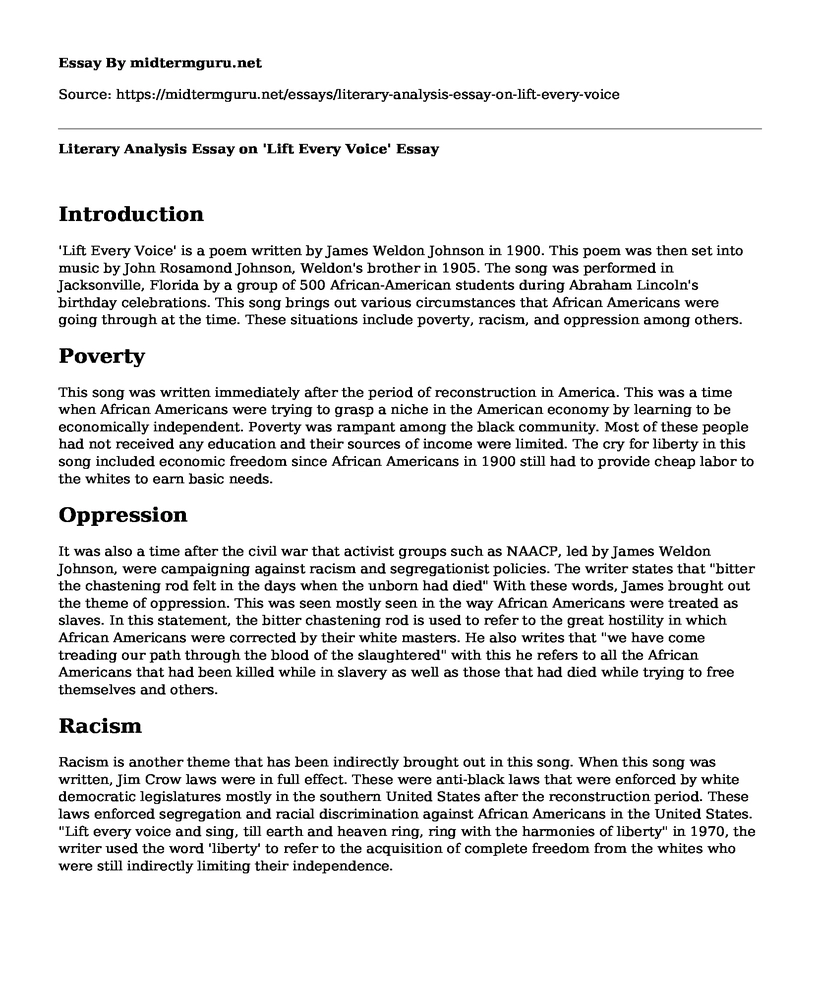Introduction
'Lift Every Voice' is a poem written by James Weldon Johnson in 1900. This poem was then set into music by John Rosamond Johnson, Weldon's brother in 1905. The song was performed in Jacksonville, Florida by a group of 500 African-American students during Abraham Lincoln's birthday celebrations. This song brings out various circumstances that African Americans were going through at the time. These situations include poverty, racism, and oppression among others.
Poverty
This song was written immediately after the period of reconstruction in America. This was a time when African Americans were trying to grasp a niche in the American economy by learning to be economically independent. Poverty was rampant among the black community. Most of these people had not received any education and their sources of income were limited. The cry for liberty in this song included economic freedom since African Americans in 1900 still had to provide cheap labor to the whites to earn basic needs.
Oppression
It was also a time after the civil war that activist groups such as NAACP, led by James Weldon Johnson, were campaigning against racism and segregationist policies. The writer states that "bitter the chastening rod felt in the days when the unborn had died" With these words, James brought out the theme of oppression. This was seen mostly seen in the way African Americans were treated as slaves. In this statement, the bitter chastening rod is used to refer to the great hostility in which African Americans were corrected by their white masters. He also writes that "we have come treading our path through the blood of the slaughtered" with this he refers to all the African Americans that had been killed while in slavery as well as those that had died while trying to free themselves and others.
Racism
Racism is another theme that has been indirectly brought out in this song. When this song was written, Jim Crow laws were in full effect. These were anti-black laws that were enforced by white democratic legislatures mostly in the southern United States after the reconstruction period. These laws enforced segregation and racial discrimination against African Americans in the United States. "Lift every voice and sing, till earth and heaven ring, ring with the harmonies of liberty" in 1970, the writer used the word 'liberty' to refer to the acquisition of complete freedom from the whites who were still indirectly limiting their independence.
Change
Change is highlighted severally in this song. The writer points out that the black community has come from far and we're still headed far. In lines 14-16, the writer points out that they have come from far and are still not weary, to the land on which their ancestors had been enslaved. He also compares their gloomy past to their happier days in the present.
Lines 22 through to the end portray this as a religious song. The writer invokes God by referring to him as God of their weary years and silent tears. He further points out that God guided them through the tough days of slavery until the finally acquire their freedom. The writer completes song with a prayer, praying that the people would stay true to God and to their native land.
Conclusion
'Lift every voice' is a song written in 1900 by James Weldon Johnson and later set into music by his brother. This song became very popular among America's black population as it highlighted the circumstances they were going through. These include racism, oppression and poverty.
Bibliography
Johnson, John Rosamond, and James Weldon Johnson. Lift every voice and sing. Hawthorn Books, 1970.
Gavins, Raymond. The Cambridge Guide to African American History. Cambridge University Press, 2016.
Dingle, Derek T., Reginald F. Lewis, and Blair S. Walker. "Lift Every Voice and Sing." The Cambridge Guide to African American History (2016): 168.
Cite this page
Literary Analysis Essay on 'Lift Every Voice'. (2022, Dec 21). Retrieved from https://midtermguru.com/essays/literary-analysis-essay-on-lift-every-voice
If you are the original author of this essay and no longer wish to have it published on the midtermguru.com website, please click below to request its removal:
- Analysis of Emily Dickinsons Poetry
- Oscar Wilde: Disobedience Is a Valuable Human Trait
- Literature Essay Sample: Effect of Imagination on Physical Spaces in Peter Pan
- A Research Paper Example on Scott Fitzgerald's Babylon Revisited
- Critical Essay on Power By Tobias Wolf
- Garcia Marquez's 'One Hundred Years of Solitude': Transcending Inferiority - Research Paper
- Literary Analysis Essay on "A Doll's House"







